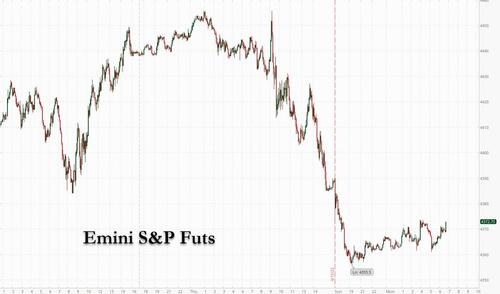Futures Slide, Nat Gas Soars As Traders Return From Holiday
Equity futures fell, Treasury yields rose and nat gas prices soared to the highest since 2008 as US markets reopened after a three-day holiday weekend while the U.K. and euro-zone markets remain closed. Nasdaq 100 futures led the retreat, falling 0.3% at 730 a.m. EDT after tumbling as much as 0.8%, and signaling a bearish start to the week after the U.S. market was closed on Friday for a holiday. S&P 500 futures also dropped 0.2%, while European markets remained closed on Monday. Oil was flat, while a cautious overall investor mood bolstered the dollar and gold. The USDJPY was set for the longest winning streak on record.
Nat gas soared another 3%, rising to the highest level since 2008.
“We think inflation is no longer a net positive for earnings growth given the impact on costs that are now showing up in margins,” Morgan Stanley strategists led by Michael Wilson wrote in a note. The effects of soaring prices “are now more likely to be a headwind to growth.”
In U.S. premarket trading, Twitter rose after Elon Musk said the economic interests of the board are not aligned with shareholders as the social media company took steps to ward off his takeover attempt. Meanwhile, DiDi Global plummeted after the company said it will hold an extraordinary general meeting on May 23 to vote on delisting its shares from the New York Stock Exchange.
Fed Chair Jerome Powell may reinforce bets that the central bank will raise interest rates by a half point in May when he speaks at an event on Thursday. Later that day he’s due to participate in a panel hosted by the International Monetary Fund. Investors will also focus on earnings and guidance as companies from Bank of America to The Bank of New York Mellon Corporation report on Monday.
The pattern across markets suggests investors remain uncertain whether high inflation has peaked or not. Price pressures are being fanned by supply-chain snarls from China’s Covid restrictions and disruptions to commodity flows due to the war. Concern is growing that the U.S. economy faces a downturn as the Fed pivots toward aggressive policy tightening to contain the cost of living. History suggests the Fed will face a difficult task in tightening policy to cool inflation without causing a U.S. recession, according to Goldman Sachs Group Inc. It put the odds of a contraction at about 35% over the next two years.
“Major regime change is rarely smooth in either geopolitics or economics, and markets are under-pricing these risks,” Eric Robertsen, chief strategist at Standard Chartered Bank Plc, wrote in a note. “We are increasingly concerned about a summer of turbulence and volatility.”
Meanwhile, in its latest downbeat note, Morgan Stanley wrote that the positive effects from inflation on earnings growth for U.S. firms have peaked as rising costs trim their margins and price pressures caused by the Ukraine war hit consumers.
U.S. index futures followed a decline in Asia-Pacific stocks, which were sapped by Japan and China, despite the latter reporting stronger than expected GDP while March economic data confirmed that recent lockdowns have crippled the local economy. Markets in Australia, Hong Kong and much of Europe remain shut for Easter.
Asian stocks dropped for a second day in holiday-thinned trading amid continued concern over the impact of inflation and efforts to contain it on global economic growth. The MSCI Asia Pacific Index fell as much as 1.1%, with India, Vietnam and Japan leading losses among national benchmarks. Mumbai-listed IT giants were among the biggest drags on the regional gauge after disappointing results from Infosys due to surging wages. Hong Kong and Australia remained closed for Easter holidays. Energy stocks outperformed after oil climbed on political unrest in Libya and Russia’s warning of the potential for record prices if more nations ban its products. Concerns of energy-driven inflation and moves by the Federal Reserve and other central banks to combat it have driven the recent global equity selloff, with tech stocks bearing the brunt in Asia. Meanwhile, China reported faster economic growth for the first quarter, while retail sales in March showed the first monthly decline since July 2020, as markets brace for the impact of the latest Covid outbreaks and lockdowns. The nation’s central bank refrained from lowering interest rates Friday, disappointing investors who had been looking for a cut. China Jitters Mount as Easing Calls Echo Across Trading Floors “China’s first quarter GDP was a bit stronger than expected, but what matters now is how the economy is doing after lockdowns in Shanghai so I see very limited impact on markets,” said Ayako Sera, a market strategist at Sumitomo Mitsui Trust Bank. “I would think we are just seeing a calm before the storm.”
In geopolitics, Ukrainian officials said the remaining defenders of Mariupol are encircled by Russian forces but have not surrendered the strategically important port city, as a deadly strike was reported in Lviv near the Polish border. Ukrainian officials will be in Washington for this week’s meetings of the International Monetary Fund and the World Bank to seek financial support.
In rates, Treasuries were higher across the curve by ~1bp, led by longer-maturity issues; 10- and 30-year yields reached new YTD highs, steepening the curve. 10-year Treasury yields edged down one point to 2.83% in the Asia session after rising as much as 5bps earlier in the session to 2.88% and rising 13 basis points last week; 30-year as much as 4.4bp to 2.96%; 2s10s and 5s30s spreads are wider but remain inside last week’s ranges, when both steepened sharply for a second straight week as traders dialed back the total amount of Fed tightening that’s expected following smaller-than-expected increase in the March core CPI. Yields climbed during Asia session amid speculation the market will move further toward pricing in a half-point rate increase by the Fed at its May meeting, already almost fully priced in.
In FX, a gauge of the dollar rose against all its Group-of-10 peers; The New Zealand and Australian dollars led declines while the Japanese yen outperformed, swinging between gains and losses as BOJ Governor Haruhiko Kuroda said the currency’s rapid moves were fueling negative effects on the economy. The dollar extended its advance for a 12th day versus the yen, the longest winning streak on record, according to data going back five decades compiled by Bloomberg. USD/JPY up by as much as 0.3% to 126.79; one-week risk reversals at a 35 basis-point premium in favor of the topside. Bank of Japan Governor Haruhiko Kuroda said a weak yen is good for the economy, although a rapid drop can disrupt corporate planning.
“With several markets closed for holiday today, the low liquidity may potentially amplify the risk-off market moves, aiding to support the dollar strength,” said Jun Rong Yeap, market strategist at IG Asia Pte.
The currency market stuck to the trading patterns of recent days as a holiday-thinned session on Monday brought low volumes in spot and options markets alike.
Market Snapshot
S&P 500 futures down 0.4% to 4,371.75
MXAP down 0.9% to 172.33
MXAPJ down 0.7% to 572.84
Nikkei down 1.1% to 26,799.71
Topix down 0.9% to 1,880.08
Hang Seng Index up 0.7% to 21,518.08
Shanghai Composite down 0.5% to 3,195.52
Sensex down 2.2% to 57,073.46
Australia S&P/ASX 200 up 0.6% to 7,523.43
Kospi down 0.1% to 2,693.21
Brent Futures down 0.4% to $111.27/bbl
Gold spot up 0.7% to $1,991.92
U.S. Dollar Index up 0.22% to 100.72
Top Overnight News from Bloomberg
U.S. natural gas prices surged to the highest level in over 13 years as robust demand tests drillers’ ability to expand supplies
China reported its biggest decline in consumer spending and worst unemployment rate since the early months of the pandemic as Covid lockdowns put a strain on the world’s second- largest economy
Shanghai reported its first deaths as the biggest Covid flareup China has faced during the pandemic prompted more cities around the country to impose restrictions on their residents
The odds of an economic contraction in the U.S. over the next two years are about 35%, according to Goldman Sachs Group Inc.
Long-maturity Treasuries are contending with their biggest drawdown on record, according to their most popular exchange-traded fund
Japan’s giant investors look set to bet on yen weakness continuing and boost their purchases of Treasuries over the rest of the year
A more detailed look at global markets courtesy of Newsquawk
Asian stocks traded mostly negative and US equity futures were also subdued amid a higher yield environment as gains in energy prices stoked inflationary’ concerns, while market sentiment was also clouded by the mass holiday closures for Easter Monday and with participants reflecting on the recent PBoC actions and Chinese GDP data. Nikkei 225 (-1.6%) underperformed and fell beneath the 27k level with the index not helped by a choppy currency as officials continued their jawboning including BoJ Governor Kuroda who stated the recent Yen weakening has been quite sharp and that an excessively weak Yen or the currency’s rapid depreciation can have a further negative impact but is basically positive overall. KOSPI (+0.1%) was indecisive after North Korea conducted projectile launches a day after the 110th birth anniversary of leader Kim’s late grandfather and state founder Kim II Sung, while the US and South Korea are also to begin their spring training exercises this week. Shanghai Comp. (-0.8%) was negative following the PBoC’s recent actions including the narrower than expected 25bps RRR cut on Friday which follows the central bank’s surprise decision to keep its 1-year MLF rate unchanged and with headwinds from the ongoing COVID-19 concerns in China where more cities tightened controls and Shanghai reported its first fatalities from the current outbreak but also recently unveiled plans to resume production in the city. Furthermore, stronger than expected Chinese GDP growth for Q1 and Industrial Production in March failed to spur risk appetite, as the data only partially took into account the latest restrictions including the lockdown in Shanghai that began in late March, while Retail Sales disappointed and the Unemployment Rate increased. As a reminder, markets in Australia. New Zealand and Hong Kong were closed for holiday and there are also mass closures across Europe including the UK for Easter Monday.
Top Asian News
Larsen Said to Weigh Merging Tech Arms Into $22 Billion Firm
Sri Lanka Must Show IMF Sustainable Debt Plan to Secure Aid
Tesla Shanghai Sets Out Hand Washing, Sleeping Plans for Workers
DiDi Shares Plunge in U.S. Premarket on Plan for Delisting Vote
Europe remains closed for the Easter holiday
US Event Calendar
10:00: April NAHB Housing Market Index, est. 77, prior 79
Central Banks
16:00: Fed’s Bullard Discusses the U.S. Economy and Monetary Policy
Tyler Durden
Mon, 04/18/2022 – 07:48

